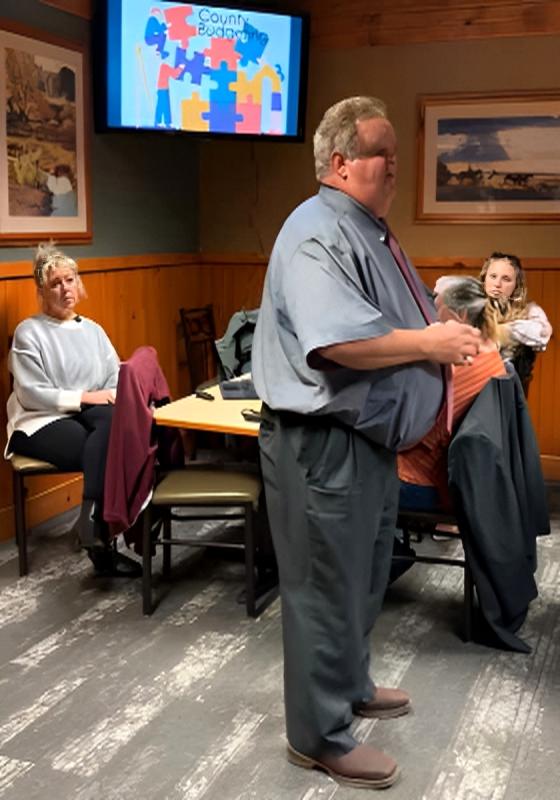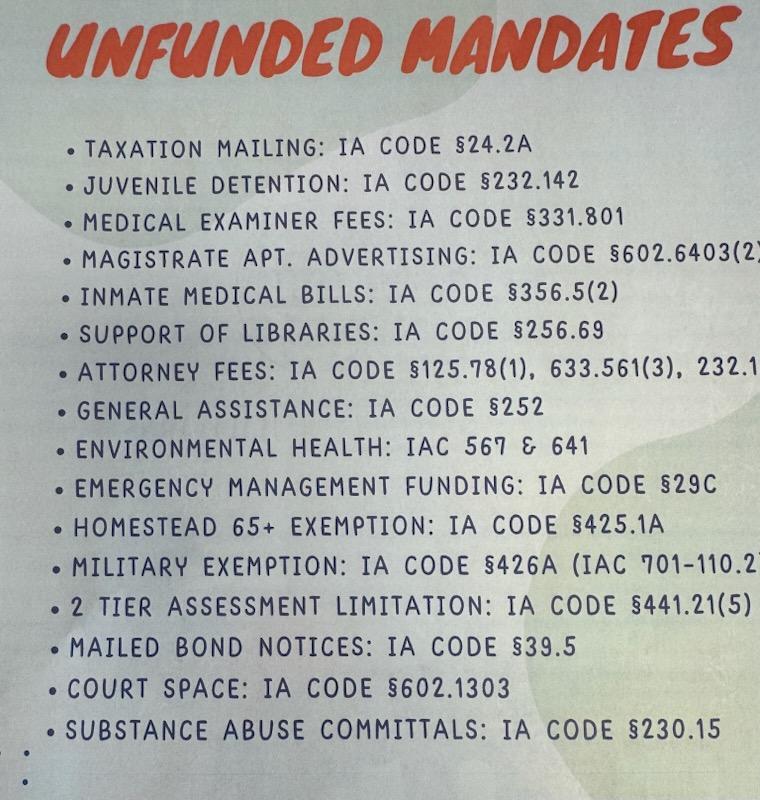Updated: Please note the second photo which includes a list of some of the unfunded mandates handed down from the state requiring the county to cover these expenses.
---
The Vinton Kiwanis welcomed two special guests at their recent meeting — Benton County Attorney Ray Lough and Benton County Auditor Hayley Rippel — who shared updates about their offices and the work happening across the county.
Lough, who began serving as County Attorney in 2023, leads a team of nine. His assistant, Alicia, brings 26 years of legal experience and, according to Lough, is “a walking encyclopedia of Iowa case law.” She handles the county’s criminal cases, while Derek Marsh, who Lough called “an incredible addition and an excellent lawyer,” manages the county’s civil matters.
Lough himself oversees juvenile and magistrate cases, serves as ADA Coordinator, and handles budget, management, and payroll duties. He also chairs both the Opioid Committee and the Security and Safety Committee, and along with Auditor Rippel, helps manage human resources issues for the county.
Two areas have grown significantly under his watch: digital evidence and juvenile law. Where cases used to include perhaps one video, Lough said now nearly every case has at least two — each requiring careful review. “Part of preparing these cases includes watching every video and reading each report,” he explained. One ongoing case involves a seven-hour standoff, with 28 witnesses and more than 500 hours of video to review.
In the juvenile system, the increase has been striking. When Lough took office, his department handled around 25–30 cases in 2023 with a budget of about $50,000. So far in 2025, that number is approaching 100 cases, and the cost for detention and shelter placements is expected to near $200,000. The nature of the offenses has also become more serious, with two threatened school shootings and one case where a juvenile assisted in a suicide.
On the Opioid Committee the committee continues to direct settlement funds where they’re most needed — including to Virginia Gay Hospital, ASAC, and Foundation 2 — while also helping offset expenses for the county jail. He noted that once someone enters jail, they lose Medicaid coverage, making the county responsible for their medical and mental health care.
Auditor Hayley Rippel shared insight into the county’s complex budgeting process, describing it as a puzzle built from three years of financial data — the past, current, and upcoming budgets. Her office balances unpredictable expenses such as the county medical examiner’s costs while navigating state-level changes, including this year’s revision to the Homestead Law, which gives property owners a larger tax credit but reduces revenue for county operations.
Rippel also manages “pass-through funds,” such as opioid settlement dollars, which come with strict regulations about where and how they can be used. Her team ensures those funds are tracked and spent according to state requirements.
Each year, county departments receive reports showing their past spending to guide next year’s planning. Departments are limited to those budgeted amounts unless the Board of Supervisors approves changes. Even grant money must be formally added to a department’s budget before it can be spent.
When budgeting, things like future expenses for the medical examiner, the juvenile detention costs and mandates handed down from the state cannot be planned for, and the county has to adjust to accommodate these expenses.
Following a question concerning Secondary Roads and the snow budget, Rippel explained that it operates differently, drawing from Rural Funds and Local Option Sales Tax (L.O.S.T.) revenue. The department is also funded through the general fund. When there are unused funds they are returned to the general fund. The department works on a five-year plan tied to long-term federal grants and infrastructure projects.
Another major change came with the creation of the Emergency Medical Services (EMS) fund, approved two years ago. The levy brings in about $1.2 million annually, distributed among 13 local services, including Belle Plaine, North Benton Ambulance, and Blairstown — the county’s transport services. Benton County was among the first in Iowa to adopt the 15-year EMS levy, now joined by 20 more of the state’s 99 counties.
The Vinton Kiwanis continues to bring community and civic leaders together for programs that keep members informed about local issues.
To follow the club or learn how to join, visit their Facebook page.


Comments
Submit a CommentPlease refresh the page to leave Comment.
Still seeing this message? Press Ctrl + F5 to do a "Hard Refresh".